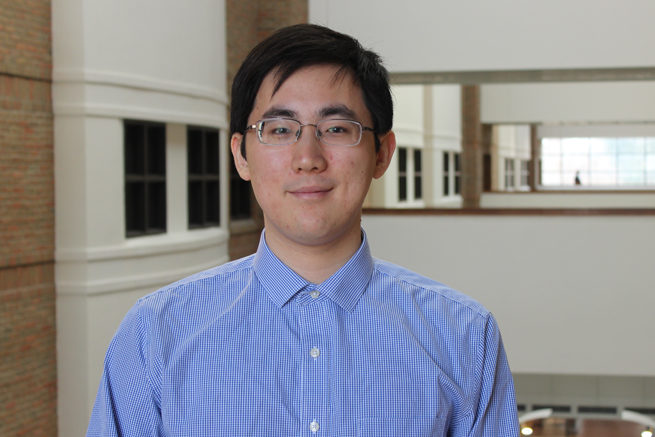Xiang Yin earns Pre-Doc Fellowship for research in cyber-physical systems
Xiang’s research focuses on developing new methods to synthesize different control and sensing strategies in a discrete-event system.

 Enlarge
Enlarge
Xiang Yin, PhD student in ECE, has been awarded a Rackham Pre-Doctoral Fellowship for his research with Prof. Stéphane Lafortune in the field of cyber-physical systems and discrete-event systems.
A cyber-physical system is an engineering system that involves physical elements, like cars, aircraft, or power plants, that are controlled by computers on a network. Discrete-event systems are an important class of cyber-physical systems, where the system’s behavior is driven by events over time.
Xiang’s research focuses on developing new methods to synthesize different control and sensing strategies in a discrete-event system. Today’s design tools that handle the demands for safety, security, performance, and certification of many critical systems are inadequate, and rely on case-by-case solutions. Xiang has developed a uniform approach that can be applied to a variety of requirements while accounting for sensor noise, environmental disturbances, and other limitations.
This project has already solved a problem of controller synthesis that has remained open in the field for more than 25 years. The next step is to develop an approach to optimizing sensor use based on energy, bandwidth, and security constraints. He also proposes methods to deal with large-scale networked systems, where the information structure is decentralized and physical components widely distributed. Eventually, these categorical solutions could be applied to huge industrial systems.
Xiang’s research has been published in IEEE Transactions on Automatic Control and Automatica, the leading journals in the field of control engineering. He served as session chair of Discrete-Event System sessions in the IEEE American Control Conference and the IEEE Annual Conference on Decision and Control. He was also selected as an Outstanding Reviewer by Automatica for his outstanding services as a reviewer.
Xiang originally studied for a Bachelor’s degree in Power Electronics and Control at Zhejiang University. During that time, he discovered a book written by John Holland, a former U-M alumnus and EECS faculty member famous for his work in genetic algorithms. Reading Holland’s textbook introduced Xiang to the work coming out of Michigan, and put the school on his radar when he began his search for graduate programs.
After he graduates, Xiang hopes to return to China and seek a faculty position.
 MENU
MENU 
